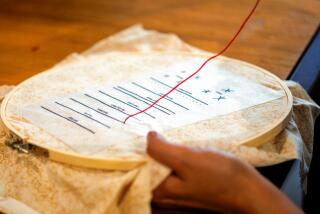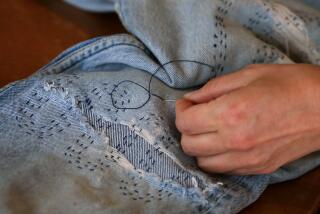Photo Essay : Where the Poor Sew Up a Future
- Share via
In a labyrinth of alleys lined with open sewers, amid concrete huts topped with corrugated tin, among the desperately poor people of a slum called Golibar north of Bombay, India, a small miracle survives.
About 300 people--mostly women and recovered leprosy patients--sew unique clothing and create small gifts for export to the United States. They do not labor for a local sweatshop or some distant foreign conglomerate. They work for themselves.
The “profits” from the clothing and gifts help provide modest incomes, home loans and adult education and finance a catalogue in which Indian artists and American customers compare notes on women’s lives and other issues.
For 14 years, a nonprofit group now known as SHARE (Support the Handicapped’s Rehabilitation Effort), has provided employment, education and most important, dignity, to some of India’s most downtrodden people. The education is crucial. Many women learn to write their names for the first time through a SHARE program overseen by Philomena Fernandes, social program director.
A social worker named Pushpika Freitas is the dreamer behind the program. She lives in Evanston, Ill., outside Chicago, where she is executive director of MarketPlace, the sales outlet for SHARE products.
But her childhood was spent in India, where her mother, a social-work volunteer, helped deliver medical services in the Bombay area. When a German organization asked Freitas to set up a center to help leprosy patients become economically independent, she realized that even healthy women could benefit from such help.
“I realized women were taking the burden, the responsibility of bringing up their families, but they had no control over their lives or the money they earned,” she says. So, in 1980 she began the SHARE program.
At first, the participants made patchwork quilts, but they soon realized there was more money to be made in garments. When visiting a friend in Chicago, Freitas brought samples of their work, showed them to other friends and the marketing network that became MarketPlace was born. It incorporated as a nonprofit group in 1986.
Today, the women also make gifts such as hand-painted stationery, table covers and candle holders--more than 3,000 items each year. The program can be contacted by writing: MarketPlace: Handwork of India, 1455 Ashland Ave., Evanston, Ill., 60201.
More to Read
Sign up for Essential California
The most important California stories and recommendations in your inbox every morning.
You may occasionally receive promotional content from the Los Angeles Times.











